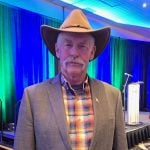BANFF, Alta. – Policing the expansion of Alberta’s intensive livestock
industry has fallen into the hands of a biologist who is still grasping
the complexities of the agriculture business.
Brian Bietz, head of the Natural Resources Conservation Board, or NRCB,
has been assigned the gargantuan task of hiring staff, meeting industry
players and learning the industry as quickly as possible to make new
government legislation a reality.
Having an outside agency deliver someone else’s standards and
Read Also

Alberta rancher finds success with virtual fencing
Increased use of virtual fencing in cattle industry in Canada showcased at Innovation on the Range in Southern Alberta.
regulations is unique, Bietz told farmers attending the Banff pork
seminar.
The board is responsible for approving new or expanding livestock
operations based on a set of newly minted government regulations and
standards that must be applied equally throughout the province.
“We are accountable to ensure this industry is operating properly,” he
said. “It is our job to take things back to the department when things
are not working.”
The NRCB is largely unknown to the agricultural industry and in the
past was responsible for dealing with the oil and gas sector.
It is a quasi-judicial regulatory body required to examine developments
from economic, environmental and social perspectives.
The newly expanded board has hired a technical staff of engineers and
other advisers.
Four regional offices have opened in Fairview, Barrhead, Red Deer and
Lethbridge. Anyone wishing to build must first contact NRCB staff at
one of those offices.
Because the board wants applications written properly the first time,
staff will walk applicants through the procedures. Six agricultural
engineers are also available to help, but they will not do all the work
required.
To prevent conflict of interest, board members cannot run a confined
feeding operation or be an elected official. Bietz expects the board
will be able to make decisions within 20 working days.
“You may not like the decision and you can appeal it, but I warn you
that the hurdle is fairly high. We have to generate consistency in our
decision-making process.”
All developments must keep records of their activities for five years,
but inspectors are unlikely to appear on the farm unless there is a
complaint. There will be six inspectors for the entire province.
“We’re not enviro-cops,” Bietz said.
Farmers can also ask for an inspection to ensure they are in
compliance. If there is a problem, the farmer will receive a written
explanation and will be told what needs to be done to bring the
operation up to standard. A deadline for compliance will be issued.















